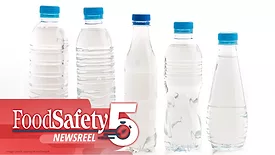Chemical
Judge Blocks West Virginia Food Additive Ban
HB 2354's provision related to school meals still stands.
January 6, 2026
Study Identifies Commonly Consumed Food Additive Mixtures, Questions Public Health Implications
Ultra-processed foods contributed to half of children's total daily energy intake.
January 6, 2026
Never miss the latest news and trends driving the food safety industry
Newsletters | Website | eMagazine
JOIN TODAY!Copyright ©2026. All Rights Reserved BNP Media.
Design, CMS, Hosting & Web Development :: ePublishing











